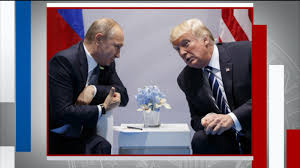‘Trump-Putin meeting equally important for both superpowers’

Kremlin chiefs said high-level talks were now needed to kick-start dialogue over a wide range of issues that have seen relations between the two superpowers take a nosedive.
Mr Putin’s spokesman Dmitry Peskov said: “We are still convinced that such a meeting is equally necessary for both Moscow and Washington.”
Mr Peskov said Russia remained ready for a bilateral summit, as well as for other meetings at various levels, “in order to start discussing pressing matters concerning the two countries and issues of global strategic stability”.
The two presidents were scheduled to hold a meeting on the sidelines of the G20 summit in Argentine capital Buenos Aires on November 30 but Mr Trump pulled out at the last minute in response to November 25 clashes off the coast of Crimea when Russian special forces seized three Ukrainian naval vessels and captured 24 sailors accused of illegally entering Russian waters.
Moscow said it had expressed regret over the US President’s decision and said on numerous occasions that the two heads of state needed to hold a meeting to discuss Washington’s plans to pull out of a key nuclear weapons accord and other pressing issues.
But US presidential national security adviser John Bolton appeared to reiterate Washington’s position yesterday when he suggested it talks would not be possible while Moscow continued to hold the ships intercepted in the Kerch Strait.
He said: ”I don’t see circumstances in the foreseeable future where such a meeting could take place until the ships and crews are released.”
Mr Trump wants out of the 1987 Intermediate-range Nuclear Forces (INF) Treaty which he believes has been regularly broken by the Kremlin and also rendered irrelevant by China’s nuclear weapons programme.
Mr Putin warned he would be forced to respond if the US walks away from the historic accord which was signed by Mikhail Gorbachev and Ronald Reagan towards the end of the Cold War.
The INF treaty eliminated the medium-range missile arsenals of the world’s two biggest nuclear powers and reduced their ability to launch a nuclear strike at short notice.
US Cruise and Pershing missiles deployed in Britain and Germany were removed as a result of the treaty while the Soviet Union pulled back its SS-20s out of European range.
Russian officials said Washington had failed to provide any objective data showing cruise missile trials had been conducted in defiance of the accord.





